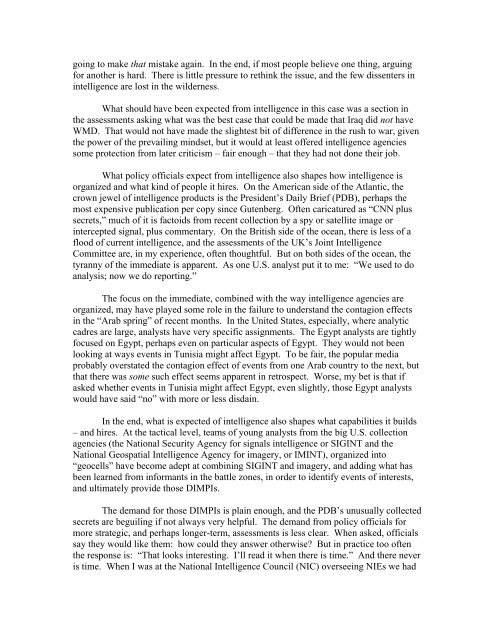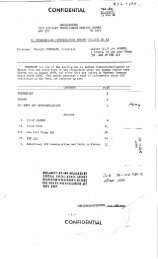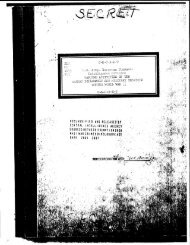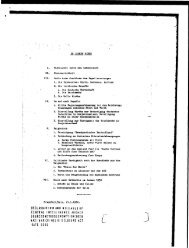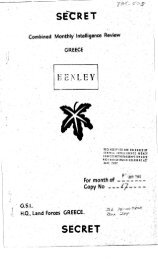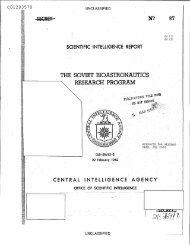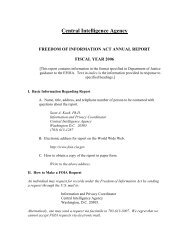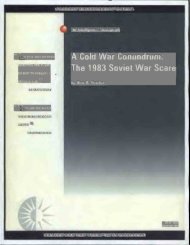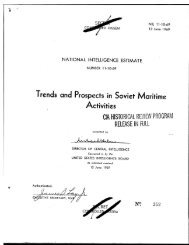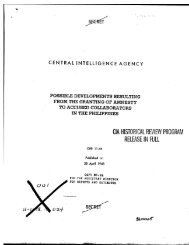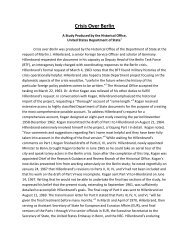2011-05-25 What Should We Expect of Intelligence - CIA FOIA
2011-05-25 What Should We Expect of Intelligence - CIA FOIA
2011-05-25 What Should We Expect of Intelligence - CIA FOIA
Create successful ePaper yourself
Turn your PDF publications into a flip-book with our unique Google optimized e-Paper software.
going to make that mistake again. In the end, if most people believe one thing, arguing<br />
for another is hard. There is little pressure to rethink the issue, and the few dissenters in<br />
intelligence are lost in the wilderness.<br />
<strong>What</strong> should have been expected from intelligence in this case was a section in<br />
the assessments asking what was the best case that could be made that Iraq did not have<br />
WMD. That would not have made the slightest bit <strong>of</strong> difference in the rush to war, given<br />
the power <strong>of</strong> the prevailing mindset, but it would at least <strong>of</strong>fered intelligence agencies<br />
some protection from later criticism – fair enough – that they had not done their job.<br />
<strong>What</strong> policy <strong>of</strong>ficials expect from intelligence also shapes how intelligence is<br />
organized and what kind <strong>of</strong> people it hires. On the American side <strong>of</strong> the Atlantic, the<br />
crown jewel <strong>of</strong> intelligence products is the President’s Daily Brief (PDB), perhaps the<br />
most expensive publication per copy since Gutenberg. Often caricatured as “CNN plus<br />
secrets,” much <strong>of</strong> it is factoids from recent collection by a spy or satellite image or<br />
intercepted signal, plus commentary. On the British side <strong>of</strong> the ocean, there is less <strong>of</strong> a<br />
flood <strong>of</strong> current intelligence, and the assessments <strong>of</strong> the UK’s Joint <strong>Intelligence</strong><br />
Committee are, in my experience, <strong>of</strong>ten thoughtful. But on both sides <strong>of</strong> the ocean, the<br />
tyranny <strong>of</strong> the immediate is apparent. As one U.S. analyst put it to me: “<strong>We</strong> used to do<br />
analysis; now we do reporting.”<br />
The focus on the immediate, combined with the way intelligence agencies are<br />
organized, may have played some role in the failure to understand the contagion effects<br />
in the “Arab spring” <strong>of</strong> recent months. In the United States, especially, where analytic<br />
cadres are large, analysts have very specific assignments. The Egypt analysts are tightly<br />
focused on Egypt, perhaps even on particular aspects <strong>of</strong> Egypt. They would not been<br />
looking at ways events in Tunisia might affect Egypt. To be fair, the popular media<br />
probably overstated the contagion effect <strong>of</strong> events from one Arab country to the next, but<br />
that there was some such effect seems apparent in retrospect. Worse, my bet is that if<br />
asked whether events in Tunisia might affect Egypt, even slightly, those Egypt analysts<br />
would have said “no” with more or less disdain.<br />
In the end, what is expected <strong>of</strong> intelligence also shapes what capabilities it builds<br />
– and hires. At the tactical level, teams <strong>of</strong> young analysts from the big U.S. collection<br />
agencies (the National Security Agency for signals intelligence or SIGINT and the<br />
National Geospatial <strong>Intelligence</strong> Agency for imagery, or IMINT), organized into<br />
“geocells” have become adept at combining SIGINT and imagery, and adding what has<br />
been learned from informants in the battle zones, in order to identify events <strong>of</strong> interests,<br />
and ultimately provide those DIMPIs.<br />
The demand for those DIMPIs is plain enough, and the PDB’s unusually collected<br />
secrets are beguiling if not always very helpful. The demand from policy <strong>of</strong>ficials for<br />
more strategic, and perhaps longer-term, assessments is less clear. When asked, <strong>of</strong>ficials<br />
say they would like them: how could they answer otherwise? But in practice too <strong>of</strong>ten<br />
the response is: “That looks interesting. I’ll read it when there is time.” And there never<br />
is time. When I was at the National <strong>Intelligence</strong> Council (NIC) overseeing NIEs we had


